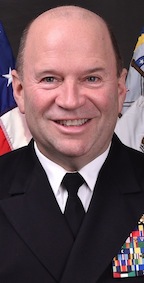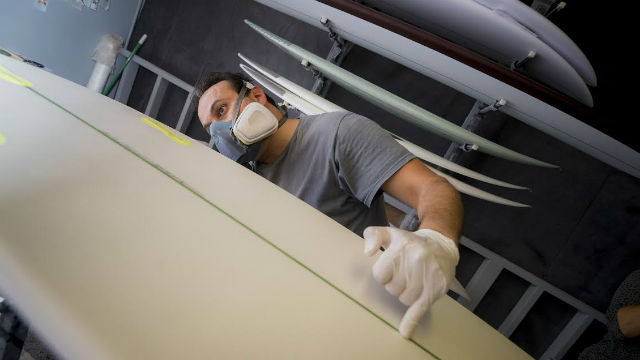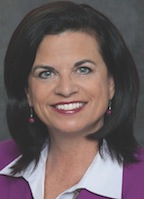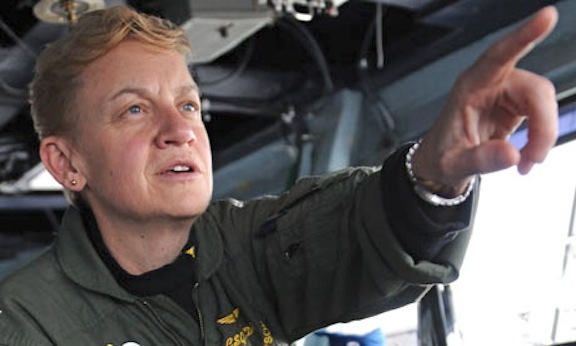Daily Business Report-April 22, 2015
Vice Adm. Nora W. Tyson would succeed Vice Adm. Kenny Floyd as commander of the Navy’s Third Fleet, based in San Diego.
First Female to Command
Navy’s Third Fleet
Vice Adm. Nora W. Tyson is in line to be the first female commander of the Navy’s Third Fleet, based in San Diego and overseeing operations in the eastern and northern Pacific.
Secretary of Defense Ash Carter announced the president’s nomination, the Department of Defense said Tuesday.

Tyson, who will succeed retiring Vice Adm. Kenny Floyd, now serves as deputy commander, U.S. Fleet Forces Command in Norfolk, Va.
A Navy spokesman said Tyson, if confirmed, would be one of three three-star admirals in San Diego — and the first woman to lead the Third Fleet, which covers 50 million square miles and dates back to World War II.
A native of Memphis, Tenn., Nora Wingfield Tyson is in her late 50s and graduated from Vanderbilt University, online biographies say. She received her commission from Officer Candidate School in Newport, R.I.
According to a Vanderbilt profile, Tyson in July 2010 became the first woman in U.S. Navy history to be named commander of a carrier strike group.
“She earned her wings as a naval flight officer in 1983 and reported to Fleet Air Reconnaissance Squadron, where she served three tours at Naval Air Station Patuxent River, Md., and Tinker Air Force Base, Okla., including one as commanding officer,” her official Navy profile says.
Tyson also commanded the amphibious assault ship USS Bataan, leading the Navy’s part in Hurricane Katrina disaster relief, and deploying twice to the Persian Gulf in support of Operation Iraqi Freedom.
Her shore tours include service on the Joint Staff as a political-military planner in the Asia-Pacific Division of the Strategic Plans and Policy Directorate; as executive assistant for the assistant to the chairman of the Joint Chiefs of Staff; as director of staff for Commander, Naval Forces Europe/Commander, 6th Fleet; as executive assistant for the Chief of Naval Operations; and as vice director, Joint Staff.
Tyson reported as deputy commander, U.S. Fleet Forces Command, in July 2013.
Tyson earned a master’s degree in national security and strategic affairs from the U.S. Naval War College in 1995.
— Times of San Diego
Council Panel to Hear Report
On Short-Term Vacation Rentals

A City Council committee today is scheduled to take up the thorny issue of short-term vacation rentals, which have left a sour taste in the mouths of San Diego beach area residents affected by noise and overcrowding. The Smart Growth and Land Use Committee, which will meet at 8:30 a.m. at City Hall, will hear reports on the subject from San Diego’s Independent Budget Analyst’s Office and the City Attorney’s Office to take public testimony and provide direction to staff on how to proceed.
Currently, the city’s regulations on property owners who rent residences to vacationers are few, according to the Independent Budget Analyst’s report. All they have to do is obtain a registration certificate to pay a room tax monthly and a rental unit business fee annually.
Earlier this year, the city treasurer’s website was updated with information for owners who rent out their homes. Nearly 1,800 owners of vacation rentals were registered with the city as of Feb. 10, but the Independent Budget Analyst estimated around 3,100 properties were available to vacationers.
While city officials and property owners are seeking clarification of the rules, neighbors of vacation homes are concerned about their nuisances, especially longtime residents who have sunk hefty amounts of money into homes in pricey beach neighborhoods.
A group called Save Our San Diego Neighborhoods said short-term rentals have “proliferated” in San Diego and expanded beyond the beach areas. A map provided by the organization shows clusters of such properties in trendy areas like the East Village, Little Italy and South Park.
— City News Service
Mayor’s Infrastructure Repair Plan
Wins Support from City Council
Mayor Kevin Faulconer’s plan to reform the infrastructure repair process in San Diego, which is meant to get projects off the ground sooner and completed faster, received a warm reception Tuesday from the City Council.
Around 20 proposals made by Faulconer are designed to change how projects are funded and processed by the city. According to the mayor’s office, the streamlining would result in projects being completed 20 percent faster than they are currently.
Councilman Mark Kersey said the proposals will keep bureaucracy from getting in the way of speeding up major construction work. “People talk about cutting red tape and making government more efficient, and that oftentimes doesn’t have a whole lot meaning, but here it really does,” said Kersey, who chairs the council’s Infrastructure Committee.
“When you’re talking about saving an average of 15 weeks off of most projects, and up to 24 weeks for certain projects — that’s four to six months — that’s substantial time in terms of getting these much-needed projects done and that much sooner that our communities and our citizens can reap the fruits of that work,” Kersey said.
The proposals were issued in a package of reports from the Public Works Department financial management staff, and were accepted unanimously by the City Council.
Most of the ideas can be implemented under mayoral authority, but five will go before the City Council for approval later in the year, Public Works Director James Nagelvoort said.
— City News Service
Is San Diego Still a ‘Navy Town’?
C-3’s April 23 Breakfast Dialogue Talks about the Armed Forces in San Diego’s Future
San Diego has long been known as a “Navy town,” with a strong presence in our region for the last century. The military constitutes a large component of our local economy; its workforce and retired personnel is a significant share of our population; and they’ve made significant impact on land use and environmental concerns.
On Thursday, 7:30-9 a.m. at Balboa Park’s The Prado, Citizen’s Coordinate for Century 3’s Breakfast Dialogue will present “Still and Always a Navy Town: The Armed Forces in San Diego’s Future.”
Moderated by land use lawyer and mediator Cary Lowe, and current C-3 board member, speakers will talk about how the perception of San Diego as a “Navy town” has changed, and how the military’s presence might impact our region in the coming decades. Speakers include:
• Dr. Lynn Reaser of Point Loma Nazarene University, on the anticipated economic impact of the armed forces in the region.
• Capt. Curt Jones, commanding officer, Naval Base San Diego, on the interaction between the armed forces and the civilian population of the region, and how military technological advances might help make San Diego more environmentally sustainable.
• James Peugh, environmental advocate, on the military’s environmental and land use impact.
As a member-supported nonprofit organization, C-3 plays a crucial role of uniting citizens to jointly craft solutions to the challenges faced in our city and region.
The event is open to the public. Tickets are $30 for members, $40 for nonmembers and $23 for students. For reservations, visit www.c3sandiego.org or call (858) 277-0900.
New SDSU Dean is Italian Scholar
Norma Bouchard, professor of Italian and comparative literary and cultural studies at the University of Connecticut, will join San Diego State University in July as dean of the College of Arts and Letters. Paul Wong, the current dean, will be retiring.
At the University of Connecticut, Bouchard has served as interim associate dean for humanities, chaired the university’s Department of Modern and Classical Languages and co-chaired its graduate program in comparative literatures.
Among Bouchard’s publications are nine books, including an anthology examining the work of Italian philosopher and renowned novelist Umberto Eco.She is vice president of the American Association of Italian Studies and serves as associate editor for cultural and media studies for the journal Italica. She is currently book review editor for Italian Culture, associate editor of Annali d’Italianistica, and immediate past chair of the MLA Book Translation Award Committee.

UC San Diego Scientists
Produce Surfboard From Algae
UC San Diego scientists have produced the world’s first algae-based, sustainable surfboard and presented it to Mayor Kevin Faulconer in honor of Earth Day.
“Our hope is that Mayor Faulconer will put this surfboard in his office right behind his desk so everyone who comes to San Diego can see how San Diego is a hub not only for innovation, but collaboration at many different levels that allowed us to make something like an algae-based surfboard,” said Stephen Mayfield, a professor of biology and algae geneticist who headed the effort to produce the surfboard.
The project began several months ago when undergraduate biology students working in Mayfield’s laboratory to produce biofuels from algae joined a group of undergraduate chemistry students to solve a basic chemistry problem: how to make the precursor of the polyurethane foam core of a surfboard from algae oil. Polyurethane surfboards today are made exclusively from petroleum.
“Most people don’t realize that petroleum is algae oil,” explained Mayfield. “It’s just fossilized, 300 million to 400 million years old and buried deep in underground.”
UC San Diego’s efforts to produce innovative and sustainable solutions to the world’s environmental problems has resulted in a partnership with the region’s surfing industry to create the world’s first algae-based, sustainable surfboard.
— Times of San Diego
Cavignac & Associates Creates
New Personal Lines Department

Cavignac & Associates has established a new Personal Lines Department, saying this broadens its range of risk management and insurance brokerage services it provides to both commercial businesses and private clients.
Veteran agent Carolyn Konecki was recruited to head the department. She brings to the firm 11 years of experience and extensive knowledge about protecting tangible assets such as high-value homes, luxury vehicles, collector cars, watercraft, aircraft and collectibles such as jewelry, wine, fine art and antique furnishings.
“We recognized a growing need among our existing clients for personal lines of insurance coverage and their preference for having their insurance matters consolidated with one trusted adviser,” said Jeffrey W. Cavignac, president and principal of the Downtown San Diego-based firm. “Carolyn comes to us with vast, up-to-date knowledge of personal lines, together with an excellent reputation for providing her clients with exceptional service.”
For nine years prior to joining Cavignac & Associates, Konecki was vice president and personal lines manager of Konecki Insurance, providing counsel and insurance brokerage services to affluent individuals. During that time, she set up the personal lines department and quadrupled the agency’s sales volume. In December of 2012, she sold the agency to Leavitt Insurance of San Diego and stayed on as vice president and personal lines manager and was the company’s top personal lines agent.
UC San Diego Health System and Scripps Health
Partner to Improve Hospice Care, Training and Research
Under a new five-year agreement, Scripps Health will work with UC San Diego Health System to provide outpatient and inpatient hospice care for UC San Diego patients, allowing UC San Diego physicians to better coordinate post-acute care for patients with chronic illness. The joint fellowship program is the only physician training program of its kind in San Diego County.
“We look forward to collaborating with Scripps to offer comprehensive, patient-centered care to our patients in need of long-term or end-of-life medical care, support and comfort,” said Paul Viviano, CEO of UC San Diego Health System and associate vice chancellor, UC San Diego Health Sciences. “In addition, the hospice and palliative medicine fellowship program will train many physicians in the core principles of pain and symptom management, communication skills and care coordination for patients with serious and life-limiting conditions.”
UC San Diego patients who select Scripps Hospice for post-acute hospice care will benefit from UC San Diego and Scripps providers working closely together to ensure the highest quality and continuum of care
The hospice and palliative medicine training program is an extension of a fellowship that was previously offered through San Diego Hospice. Gary Buckholz, M.D., UC San Diego, and Holly Yang, M.D., Scripps Health, co-direct the joint fellowship program, which will be housed at UC San Diego beginning in July 2015. The program will engage faculty from both organizations, exemplifying the teamwork required to meet the physical, emotional, social and spiritual needs of palliative care and hospice patients and their families.
The agreement also includes provisions for Scripps and UC San Diego to collaborate on clinical trials and research programs involving hospice and palliative care.


